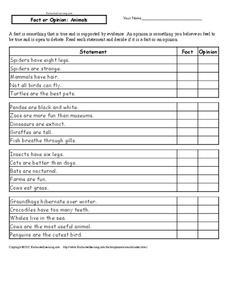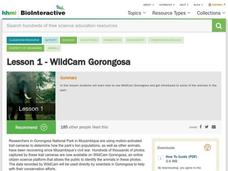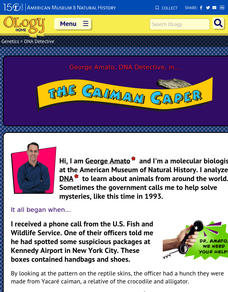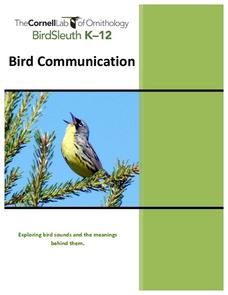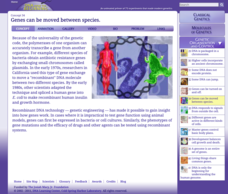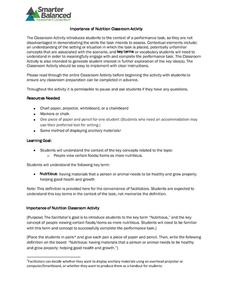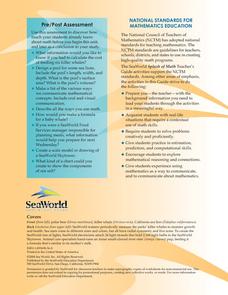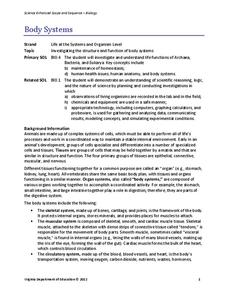Curated OER
Fact or Opinion: Animals
How many legs do spiders have? Is that an opinion, or is it a fact? Complete a worksheet with four sets of five questions about different animals and their attributes, noting whether each statement is a fact or an opinion.
K12 Reader
Irish Proverbs
Add a literary twist to your St. Patrick's day celebration with a worksheet that asks kids to explain what they think the Irish proverbs on this worksheet mean.
Channel Islands Film
Arlington Springs Man: Lesson Plan 4
West of the West's documentary Arlington Springs Man introduces viewers to the remarkable finds on Santa Rosa Island. Archaeologist have discovered on this small island that is part of the Channel island chain, human and pygmy mammoth...
Howard Hughes Medical Institute
Lesson 1: WildCam Gorongosa
Take a walk on the wild side! Episode one of an eight-part series of interactive lessons regarding Gorongosa National Park invites learners to become a part of the citizen science community. Scholars read a brief overview of the trail...
Curated OER
Lesson 1- Set Design
Line, shape, color, texture, space. The first in a three-part series of lessons intended for advanced theatre arts classes introduces the elements of set design. Class members examine maquettes and analyze how designers have put together...
American Museum of Natural History
All About Cloning
Start seeing double. The American Museum of Natural History website provides pupils with information about Dolly, the cloned sheep. Learners find out the procedure used to create Dolly along with why scientists clone animals.
American Museum of Natural History
DNA Detective
Match up the DNA code. Pupils read the website from the American Museum of Natural History about how DNA can determine whether a skin is from a particular type of reptile. Using the same technique, learners match up products with the...
Cornell Lab of Ornithology
Bird Communication
Sing for your dinner! Investigate the purpose of bird songs and strategies birds use to communicate. Through the lessons, individuals learn how to recognize different types of bird communication as well as hypothesize the purpose of...
Cold Spring Harbor Laboratory
Genes Can Be Moved Between Species
Biotechnology changes lives every day, but how did it all start? Learn about Cohen and Boyer's technique for recombinant DNA and the founding of this new scientific study. Then, scholars use the online interactive to discover how Hanahan...
Curated OER
Theology…the Use of Silence in the Classroom
Immerse your class in the Middle Ages with a thorough history lesson. After viewing examples of illuminated manuscripts such as the Book of Kells, they discuss how these were the mode of keeping and storing information employed by the...
Re Energy
Build Your Own Biogas Generator
What is biogas and how is it made? After examining background information about the sources of biogas and biogas generators, class members follow the provided information and build a biogas generator that can be used in the classroom.
3Dme Pty
Alcohol and Your Brain
Through an engaging video and quiz, learn about the effects of alcohol on specific regions of the brain, as well as general effects on the body.
Hello-Hello
Portuguese – Learn Portuguese
Marcos and Paulo have just met Ana. Watch as they use Portuguese to introduce themselves and get to know each other. Language learners then complete a series of activities designed to help them master each brief conversation.
Smarter Balanced
Importance of Nutrition
Prepare your class members for the performance task assessment on nutrition with an activity that asks class members to rank images of foods from least nutritious to most. Participants also offer reasons for why they ranked the foods the...
Sea World
Ocean Discovery
Immerse your young marine biologists in the world of marine animals. The lesson plan includes several activities that are age-appropriate for preschoolers and kindergartners, including coloring pages, gluing feathers and sand onto paper...
San Antonio Independent School District
The Election of 1824
Here is a nice set of worksheets to get you started on teaching your young historians about the "Corrupt Bargain" in the presidential election of 1824, as well as the Tariff of 1828 and the emergence of new political parties.
Sea World
Splash of Math
How can kids use math to learn about marine life? Combine math skills with science lessons in a resource featuring activities about life in the sea. Kids graph and calculate data, solve complex word problems, measure geometric shapes,...
Brooklyn Children’s Museum
Rocks and Minerals in Our Lives
Young geologists discover the important role that rocks and minerals play in our everyday lives through this series of hands-on activities. Starting off with a lesson that defines the difference between plants, animals, and minerals,...
Ventura County Air Pollution Control District
Effects of Global Warming
Your learners have probably heard of climate change, but do they really understand what it is? Study the history, details, and future implications of global warming and the greenhouse effect with a set of activities designed for an...
Virginia Department of Education
Body Systems
The human body is an amazing thing! Explore the body with your high school class as they investigate each system in detail. They learn components of each organ system and disease processes that can negatively affect general health and...
University of Maryland
Pollination
Sixteen ounces of honey requires more than 1,000 bees traveling over 100,000 miles and visiting 4.5 million flowers. The presentation includes sexual reproduction in plants, the parts and functions of a flower, pollination,...
Michigan State University
Friend or Foe?
What one person thinks is a pest may not be a pest to someone else. Here, scholars examine the characteristics of living things and pests through grand conversation and a variety of activities. Class members play a game of pest or not a...
American Chemical Society
The Ups and Downs of Thermometers
What has a thermometer earned that your pupils haven't? A degree! After reviewing the previous lessons about molecules and degrees, scholars observe how thermometers work before building their own. The module includes a activity sheet.
Centers for Disease Control and Prevention
Understanding the Epidemiologic Triangle through Infectious Disease
Introduce infectious diseases and the epidemiologic triangle. A helpful resource describes the agent, host, and environment from the three vertices as well as the time factor, which is in the middle. Scholars complete a simple...
Other popular searches
- Animal Research Projects
- Animal Research Reports
- Animal Research Paper
- Ocean Animal Research
- Animal Research Form
- Animal Research Templates
- Animal Research Worksheet
- Sea Animal Research
- Animal Research Podcasting
- Research Animal Reproduction
- Animal Research Report Form
- Sea Animal Research Projects


